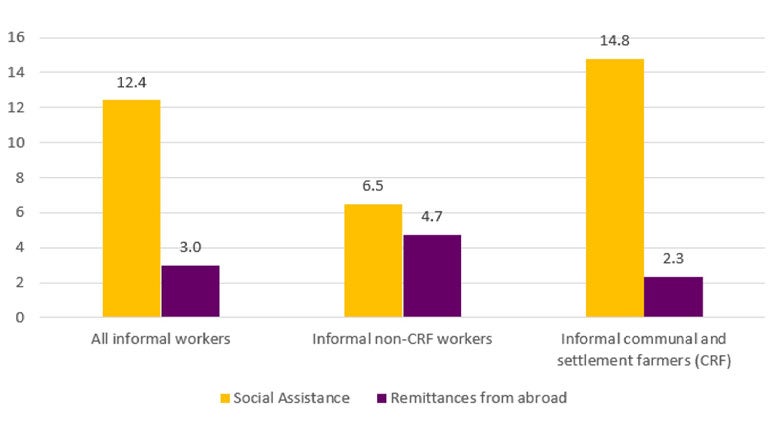 Policy discussions in Zimbabwe, home to one of the world’s largest informal economies, should shift towards identifying ways to improve wellbeing for informal workers. Photo: Arne Hoel.
Policy discussions in Zimbabwe, home to one of the world’s largest informal economies, should shift towards identifying ways to improve wellbeing for informal workers. Photo: Arne Hoel.
Zimbabwe is home to one of the world’s largest informal economies, where about three-quarters of all employment is informal. Most of those informally employed work without formal contracts in low-earning activities and without social insurance benefits. How can the well-being of informal workers be feasibly improved? This is a timely question after the COVID-19 pandemic and the macroeconomic challenges (inflation and exchange rate instability) have disproportionately impacted informal workers, exacerbating their vulnerabilities.
Informal is normal
An important first step for policy-making and programs targeting informal workers is recognizing that informal is normal. This approach involves removing the informal economy’s negative connotations and recognizing that Zimbabwe’s informal economy is likely to continue to grow as the formal economy is unable to absorb new entrants. The premise “informal is normal” also recognizes that formalization, which was considered the traditional ‘solution’ to informality in the past, is by no means a panacea.
The challenge in Zimbabwe is, therefore, to shift policy discussions away from formalization and towards identifying ways to improve the well-being of informal workers. We approach this goal in two ways: (i) understanding the size, characteristics, challenges, and opportunities of people in the informal sector in Zimbabwe; and (ii) developing policy recommendations for the Zimbabwean context by drawing on international experiences and lessons learned.
Who are the “Informal Workers”?
Using the 2017 Poverty, Income, and Expenditure Surveys (PICES) survey data, we estimated that about 73% of all Zimbabwe’s workers are informal out of which 71% are communal and resettlement farmers (smallholder farmers living in communal land or resettlement areas established under the Land Reform and Resettlement Program). See Figure 1.
To estimate these figures, we defined the informally employed as individuals aged 15 and above who were: i) paid employees (permanent or casual/temporary) without a contract, regardless of the sector, or with a contract under an establishment that is not registered or licensed; ii) employers and own account workers (communal and resettlement farmers and others) employed in an informal sector enterprise (those neither registered, nor licensed); and iii) unpaid family workers. The availability of household consumption data in the PICES allowed us to analyze the economic conditions of informal workers and whether they were covered by any government program.
Figure 1. Distribution of informal workers by employment activity
Challenges and opportunities for informal workers
Our analysis found that Zimbabwe’s informal economy is heterogeneous with respect to poverty levels. We estimated that about 34% of all informal workers were extremely poor. This was driven by informal communal and resettlement farmers whose incidence of extreme poverty was 42% compared to only 15% for other informal workers. Moreover, extreme poverty rates for all informal workers increased 10 percentage points after the 2019 economic crisis. We also found that over half of informal workers were women (52%).
Productivity of informal jobs is highly constrained, affecting those who already have limited access to finance, markets, skills, and land ownership. Income is, therefore, lower in the informal economy, particularly for women, while working conditions and access to social protection are poor. Our analysis found that only 12% of informal workers lived in a household where at least one member benefited from government safety nets or humanitarian assistance. This coverage went down to only 6% among the group of informal workers who were not farmers. See figure 2.
On the more positive side, Zimbabwe’s informal workers are well organized into informal workers associations. These provide a platform for policy dialogue and act as safety nets for the members. Indeed, the role of these structures ranges from providing support to households in case of emergency to coordinating political representation. Further, informal workers have access to digital services through the widespread use of mobile money in Zimbabwe, particularly in urban areas, presenting a strong opportunity for further financial inclusion which remains low among this group.
Figure 2. Percentage of informal workers benefiting from social assistance and remittances
Learning from international experience
The World Bank has facilitated inter-country initiatives with government officials from Kenya, Liberia, and Rwanda to share important lessons to Zimbabwean counterparts on program design, targeting, and monitoring. These countries have already taken important steps towards improving the welfare of the informally employed by leveraging social protection programs. For example, Rwanda has implemented EjoHeza, a long-term savings scheme designed for informal workers and administered by the Rwanda Social Security Board. Liberia has implemented the Youth Opportunities Project (YOP) to improve access to income generation opportunities for youth; and Kenya on the other hand, implemented an Urban Cash Response to help informal workers during the COVID-19 pandemic, leveraging mobile technology for registration and payments. Many of these ideas were analyzed against the Zimbabwean context to identify actionable recommendations.
Final recommendations
From the above dialogue and analyses emerged several next steps. Key among them is the need to leverage Zimbabwe’s highly developed mobile money ecosystem to encourage financial inclusion and engage informal workers through social assistance, social insurance, and labor market programs.
Another crucial recommendation is to develop a social insurance scheme for informal workers who may not be poor enough to be eligible for social assistance programs but remain highly vulnerable to shocks. The Government of Zimbabwe is currently prioritizing the design and piloting of a pensions system for the informally employed that will help inform the future of social insurance policy. This is a welcome development and a first step to ensure the protection of informal workers.





Join the Conversation